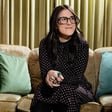
Episode 67—Carol Marine on Daily Painting, Flow States and Overcoming Burnout
This episode of The Creative Nonfiction Podcast is supported by Hippocampus Magazine, whose founder Donna Talarico, just completed her third annual conference HippoCamp. Visit the website hippocampusmagazine.com to read the great work being done and to submit your own work. Hippocampus Magazine: memorable creative nonfiction. It’s the Creative Nonfiction Podcast, the show where I speak with the world’s best artists about creative works of nonfiction: leaders in the world of narrative journalism, memoir, documentary film, essay, and radio, and tease out their stories and habits so that you can provide their skills to your own work. Thanks for listening, CNFers. This week’s guest is Carol Marine, an Oregon-based expressionistic painter, whom I met at a killer hard cider event on Friendly St. Some of the best hard cider I’ve ever had While Carol might not identify as a writer, she has written a book that I think you should pay attention to. It’s called Daily Painting: Paint Small and Often to Become a More Creative, Productive, and Successful Artist. Maybe you’re a writer looking to get into flow states. Maybe you’re a memoirist and don’t know how to get your work in front of people. Maybe you’re super introverted and have no clue how to be part of a community and network. We hit all of those topic in Carol’s life and how she exited art school super jaded by her teachers, struggled doing big, serious paintings, then dialed it down to appetizer paintings and a movement that built a brand and a career. She’s on Facebook @CarolMarineArt and is carolmarine on Instagram. Be sure to give her a follow. Her daily painting gets posted everywhere, but you should check out Carole’s Painting a Day at carolemarine.blogspot.com. I hope you get a nice hour chock full of inspiration to tackle whatever creative project you have on front and/or back burners. Lastly, if you’ve gotten anything out of this episode or any of the previous 66, I ask that you take a few seconds to leave a nice review over on iTunes. Oh, I forgot to mention! At significant personal cost, I bought more storage, so all the retired episodes are coming out of retirement a la Brett Favre. Yes, the audio sucks, but that’s sorta the point: to show the evolution and maybe the lower the bar of expectations for others looking to do something similar. So, yes, reviews are the currency of the day and add that extra bit of legitimacy to the podcast. That’s it, enjoy episode 67 with Carol Marine!



















